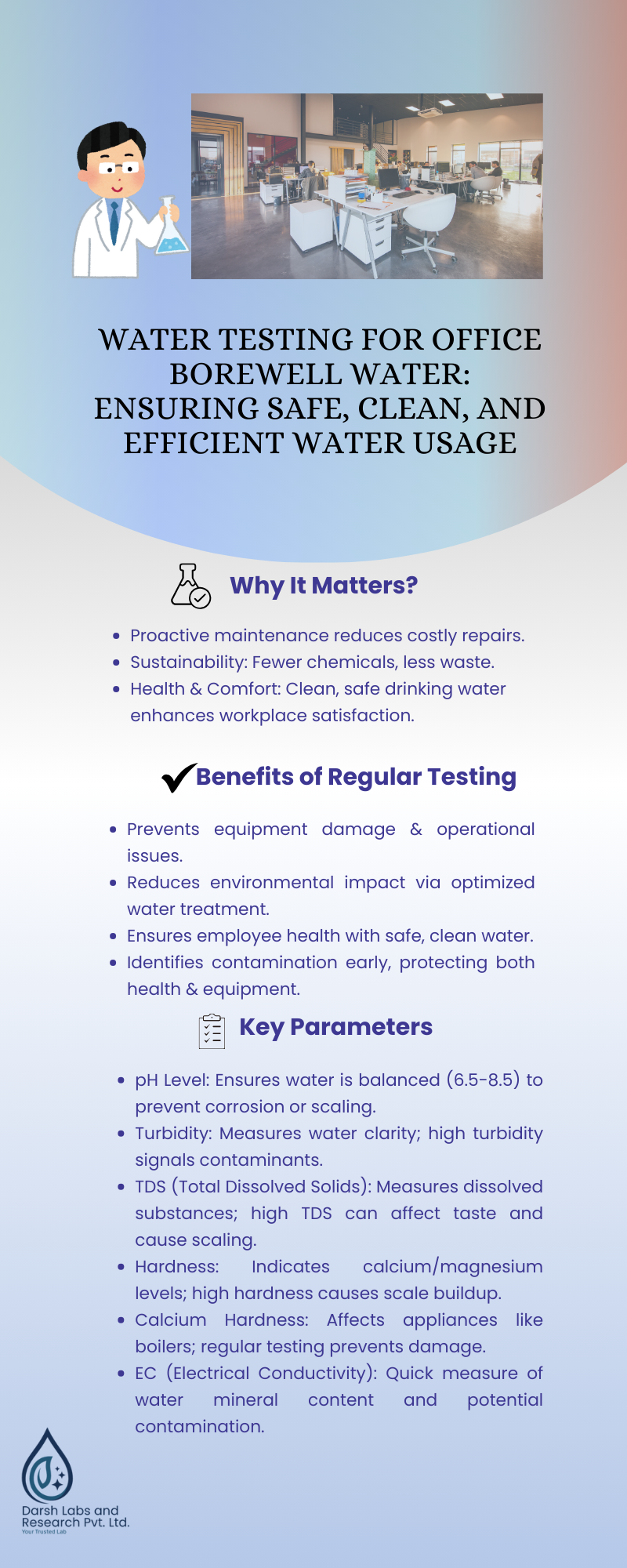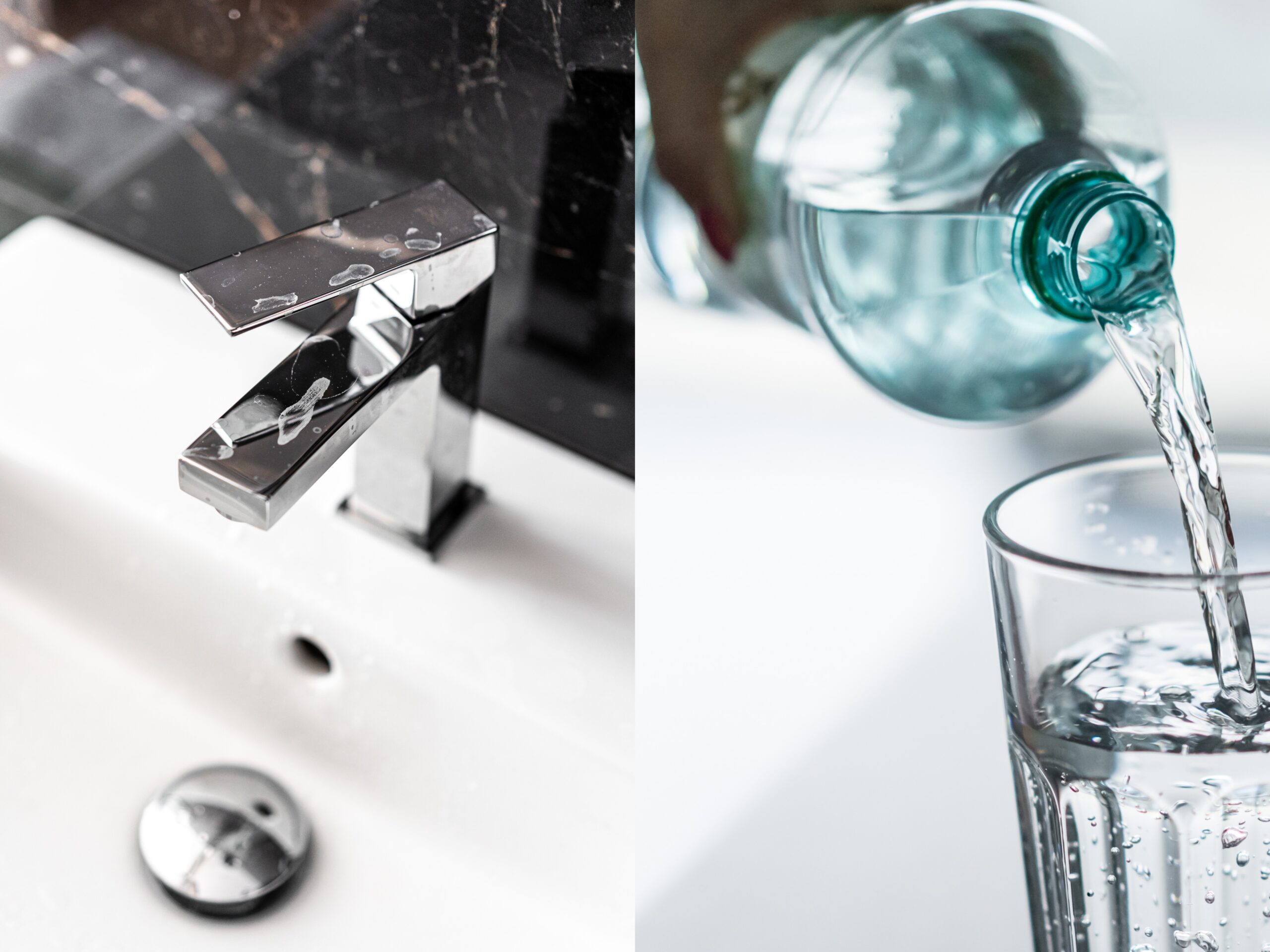Water testing is a crucial procedure to ensure the water drawn from office borewells is safe, clean, and suitable for various uses. Borewell water, while often a cost-effective solution, can contain impurities and varying characteristics that require regular monitoring. This article covers the importance of water testing for parameters such as PH level, turbidity, Total Dissolved Solids (TDS), hardness, calcium hardness, and Electrical Conductivity (EC), explaining why each is essential in assessing the water quality for office use.
The Vital Role of Water Testing in Maintaining Office Borewell Water Quality
Water testing is an indispensable tool in maintaining the safety, efficiency, and quality of borewell water in office environments. By testing key parameters such as PH level, turbidity, TDS, hardness, calcium hardness, and EC, businesses can ensure that their water supply remains free from harmful contaminants and operational issues. Regular water testing not only guarantees the health of employees but also protects valuable office equipment, making it an essential part of a comprehensive water management strategy.
Preventing Operational Issues with Regular Water Testing
In an office setting, the quality of borewell water directly impacts the performance and longevity of water-dependent equipment. By regularly conducting water testing for parameters like hardness, calcium hardness, and TDS, offices can prevent scale buildup, corrosion, and other operational issues. Early identification of water quality problems ensures that preventive measures are taken before costly repairs or replacements are needed, ensuring smooth operations in the workplace.
Ensuring Employee Health and Comfort Through Water Testing
Water testing plays a direct role in ensuring the health and comfort of employees. Contaminated or poor-quality water can lead to health concerns, such as gastrointestinal issues or skin irritations. By maintaining regular water testing protocols, offices can avoid such problems and provide employees with safe, clean drinking water. Additionally, water with the right PH level and low turbidity is more pleasant to drink, which can improve overall workplace satisfaction.
Reducing Environmental Impact Through Effective Water Testing
Water testing can also play a significant role in improving the sustainability of office water usage. By monitoring parameters like turbidity, TDS, and EC, offices can optimize their water treatment processes to use fewer chemicals, reducing environmental pollution. Proper water testing can identify the need for more efficient filtration or softening systems, ensuring that water is treated in a way that minimizes waste and lowers energy consumption. In this way, water testing not only protects office equipment and health but also contributes to a more environmentally conscious approach to water use.
The Significance of PH Level in Water Testing
The PH level of water is a primary indicator of its acidity or alkalinity. Water testing for PH helps identify whether the water is too acidic or alkaline, which can lead to corrosion or scaling issues in office plumbing. A balanced PH level (usually between 6.5 and 8.5) ensures that the water is safe for consumption and everyday use. Monitoring PH through water testing ensures that the water does not cause damage to pipes and fixtures while maintaining good taste and usability.
Turbidity: Assessing the Clarity of Borewell Water
Turbidity refers to the cloudiness or haziness of water caused by suspended particles such as dirt, silt, and microorganisms. Water testing for turbidity is essential to determine if the water is visibly clean. High turbidity levels often signal the presence of contaminants that could affect the water’s safety, making it harder to purify and potentially damaging to water treatment systems. Regular water testing for turbidity ensures that the borewell water is clear and free from harmful particles that may compromise water quality.
TDS: Understanding the Composition of Water
Total Dissolved Solids (TDS) are the dissolved substances present in water, including minerals, salts, and metals. Regular water testing for TDS provides a measure of water purity and can help detect whether the water contains harmful levels of dissolved solids. Excessive TDS can alter the taste of water, cause scaling on appliances, and may even pose health risks if the levels of contaminants are too high. By routinely testing for TDS, offices can maintain water quality and determine if additional filtration or treatment systems are required.

Hardness and Its Impact on Office Plumbing Systems
Hard water, which contains high levels of calcium and magnesium, can cause scale buildup in pipes, boilers, and appliances. This leads to inefficiency, higher energy consumption, and increased maintenance costs. Water testing for hardness helps identify if the borewell waterfalls are within an acceptable range. If water hardness is too high, softening treatment may be necessary to avoid damage to office plumbing and equipment. Regular water testing for hardness ensures the longevity of office water systems and minimizes potential disruptions.
Calcium Hardness: Focusing on Scale Prevention
Calcium hardness specifically measures the amount of calcium ions in water. It is a key contributor to scaling problems in water-using appliances, such as water heaters and cooling systems. Regular water testing for calcium hardness ensures that office water remains free from excess calcium that could lead to the formation of harmful scale. By understanding calcium hardness, offices can implement appropriate water treatment methods to prevent scaling and extend the life of their equipment.
Electrical Conductivity (EC): A Quick Measure of Water Quality
Electrical Conductivity (EC) refers to how well water can conduct electricity, which depends on the presence of dissolved salts and minerals. A high EC value often correlates with high TDS levels. Water testing for EC is an effective way to quickly assess the overall mineral content in water. By regularly testing EC, offices can detect changes in water composition, ensuring the water remains safe and suitable for use. EC testing also helps in detecting potential contamination, making it a valuable parameter in maintaining water quality.
Why Regular Water Testing Is Essential for Office Borewells
Regular water testing of office borewell water helps detect any changes in water quality, which could affect both health and equipment. Borewell water can fluctuate in quality due to seasonal changes, contamination risks, and other environmental factors. Routine testing for key parameters like PH level, turbidity, TDS, hardness, calcium hardness, and EC ensures that any potential issues are identified early. This proactive approach prevents long-term damage to office plumbing, maintains the safety of drinking water, and ensures the smooth operation of water-dependent systems.


Leave a Reply